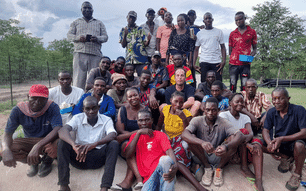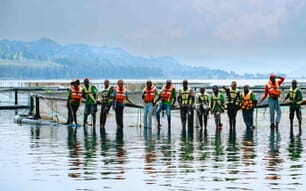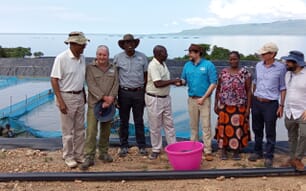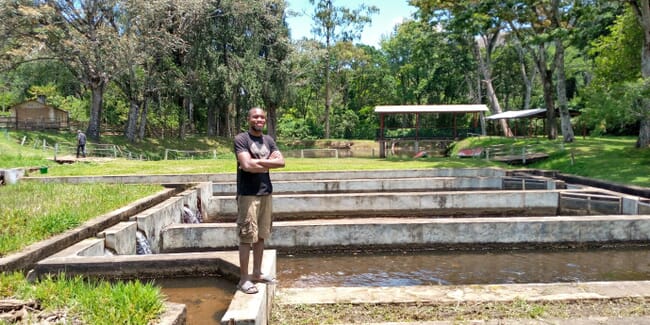
Precious Sanjama has just finished his first assignment on the University of St Andrews’ distance-learning MSc in sustainable aquaculture. Now studying in the evenings and weekends, he returns each Monday to his day job as junior grants officer for the Malawi Innovation Challenge Fund (MICF) at Imani Development in Blantyre, Malawi’s second-largest city.
Precious was successful in receiving a British Commonwealth scholarship to cover his tuition fees and, although he finds the course intensive and time-consuming, he enjoys the challenge and the chance to learn from his fellow students from different parts of the world.
Precious grew up a stone’s throw from Lake Malawi, in the village of Mpondasi, Mangochi District, where each afternoon after primary school he went down to the lakeside to play with his friends, enjoying but also learning to respect, the nature of the region’s iconic lake. After school he was accepted on the four-year fisheries science BSc course at Mzuzu University in the north of the country.
“My first choice was actually ICT [information and communications technology], as I was fascinated by computers, but I was not accepted so chose fisheries sciences after being motivated by some former fisheries diploma students who convinced me there was a future in it, in terms of jobs and opportunities,” he reflects.
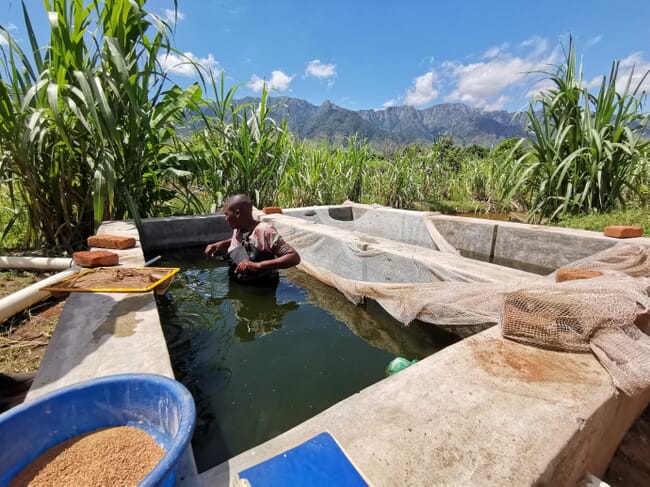
Precious believes that combining a relatively low-cost model with the right entrepreneurial individuals and the appropriate sites can create financially viable small businesses that help to meet southern Malawi’s tilapia fingerling demand.
As the course progressed, he became more interested in the aquaculture modules and he saw the sector as offering potential in the face of declining wild-caught fish landings.
“I graduated in 2017 alongside 20 others from the original 50 starting in first year. And whilst I enjoyed my studies, it was clear the course lacked practical hands-on experience and learning, something I hope has changed for new students entering now,” he says.
After leaving college at 22, he moved to nearby Nkhata Bay, also on the lake, where his mother and family had settled. The pressure was now on to find a job to recoup the costs of four years at university. Looking around locally, Precious saw opportunities to set up his own small business buying wild-caught chambo (which can refer to a number of fish in the Oreochromis family) from the fishermen and then selling them to local hotels and tourist spots as far afield as Mzimba and Mzuzu.
He quickly learnt the importance of good networking, maintaining a reliable supply and catering for his customers’ needs. One day, after four months, as he was buying fish by the lake, he came across a workshop for fishermen and women fish sellers, run by Ripple Africa. After speaking to the organisers he was offered a three-month internship working in fisheries extension. He enjoyed this experience, learning from both Ripple and the fishing community, but felt the organisation lacked an aquaculture component which could benefit local people.
As luck would have it Precious then came across an advert on Facebook for a technical officer for a Scottish government-funded small-scale hatchery development project, working alongside Umodzi, a local development organisation in Blantyre. After a successful interview he spent six months helping to run workshops and spending days out visiting and supporting carefully selected pond farmers to build and develop financially viable, small-scale, hapa-based tilapia hatcheries. He quickly learnt new construction skills and hands-on techniques from his colleagues in broodstock and fry management –skills he had read about in his college days but had never been able to practise.
For Precious the most rewarding part of the job was seeing the hatchery owners making their first sales of well-graded, quality fingerlings to a new customer, before moving on to be ready for their next order.
“Quality fingerling production and reliable supply in Malawi has always been a bottleneck,” he reflects.
However, he could see that combining such a relatively low-cost model with the right entrepreneurial individuals and the appropriate sites could create financially viable small businesses that helped to meet southern Malawi’s fingerling demand.
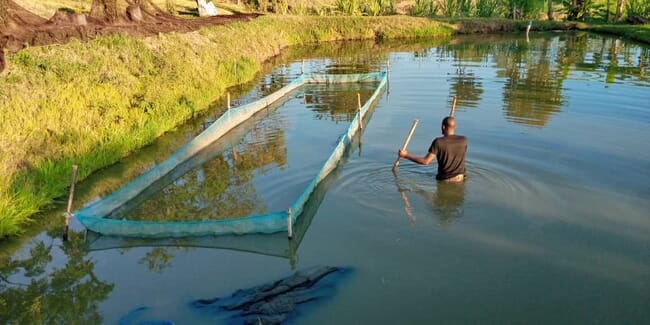
Precious has set up his own company, AquaLink Malawi, which specialises in supplying aquaculture equipment and other consultancy services to fish farmers all over Malawi
Precious also became involved in running the project’s social media site Aquapreneurs Malawian Aquaculture, updating it regularly with project news and the achievements of the small-scale hatchery operators, in the process promoting their production and sales. He also enjoyed the responsibility of designing and running a project stand and live-fish display at a Scotland Malawi Partnership
symposium in the capital, Lilongwe.
At the end of this project he moved to Imani Development in Blantyre, initially working within their local rural aquaculture projects, but soon becoming involved in wider agriculture and associated value-chain work. He enjoyed learning new skills and collaborating with international partners and donors, such as USAID, DFID and UNDP.
He continues to work with a number of the small-scale hatchery operators he helped to set up, and now, going full circle, has just started a new role with Imani as junior grants officer for the Malawi Innovation Challenge Fund. He enjoys the diversity of this role, and is now working in other sectors such as tourism, finance, irrigation and other agricultural industries, going out to meet and interact with large- and small-scale businesses and associated value chains, evaluating their progress and their use of grant funds.
As well as working towards his distance-learning master’s, Precious has set up his own company, AquaLink Malawi, together with two friends from college. This specialises in supplying aquaculture equipment and other consultancy services to fish farmers all over Malawi. They import net materials and, together with local tailors, make up specialist hapas and seine nets which have already become good sellers across Malawi. Their product range is steadily increasing and now includes measuring boards, graders, waders and feeding equipment. They have already attracted interest from the likes of WorldFish and GIZ to supply some of their projects.
“Our main challenge at this stage is capital. We started with a relatively small amount, sourced from our own pockets. Although currently limiting our operations, we are still optimistic that the company will reach great heights, and make significant impacts on the wider aquaculture sector in Malawi… but it’s still early days,” Precious reflects.
On the status of aquaculture in his country, he goes on to say:
“Malawian aquaculture is still under-developed, and it will take time to reach critical mass. In spite of this, the sector still plays critical roles in nutritional and economical security for significant numbers of Malawians, mainly in rural areas. The sector would greatly benefit from the government removing VAT on formulated fish feeds, their ingredients and aquaculture equipment, whilst also imposing a higher tax on imported fish. Zambian aquaculture companies now have offices and sales outlets in Lilongwe,” he notes.
As for the future of Malawian aquaculture, Precious believes private-sector pond and cage culture hold the key. Examples of innovative, financially viable models he thinks are worth watching include the Phata cooperative on the lower Shire River. This 600-hectare, irrigated sugarcane farm produces other crops, as well as fish, utilising well-fertilised, low-input, rice bran-fed tilapia ponds, developed to form a successful system. It turns a lucrative profit for over 1,000 cooperative members and its surrounding communities.
He also mentions Maldeco (Mangochi) as a tilapia cage and hatchery business which, following past challenges, is now beginning to move forwards. As for RAS operations, he believes them to be capital intensive, high risk and presently neither affordable nor financially viable for the majority of Malawians working in and relying on the sector.
For the well-known “project culture” he grew up with in Malawi, he says the future should be “hands on rather than the previous hand up”, with resources going towards “carefully selected smaller-scale farmers and lower-income private-sector individuals”.
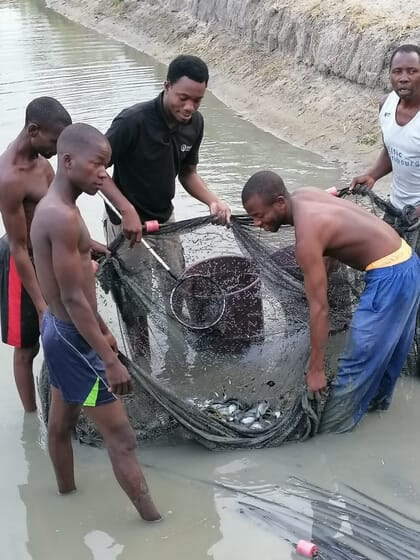
As for his own goals?
“In the longer term, I aspire to be recognised as one of the main contributors to Malawian aquaculture, helping it achieve significant, measurable gains. I will work hard to ensure this is achieved and am willing to do whatever it takes to bring positive change to the lives of fish farmers. In the next 10-15 years, I would like to establish my own fish farm, supplying local and larger domestic markets, looking further into vertically integrated approaches to raise livestock, fish and cash/food crops on the same land, something I’m aware of in Zambia, but has yet to be taken up seriously in this country,” says Precious.
“I’m increasingly aware that always improving and broadening my knowledge and networking is fundamental to my future success, alongside the experience I gain from having access to, and learning from, the projects and new startup entrepreneurs my work now takes me to each day. This already gives me ideas and much encouragement for the future of my own business,” he adds.
“Throughout the journey so far I have learnt that aquaculture is a sector requiring hands-on skills. I encourage my fellow youths to understand – this sector requires passion and commitment. For one to accrue benefits from it you have to be ready to use your hands. Putting our hands together, the sector has huge potential to make significant contributions to our country,” he concludes.
I wish to thank Precious Sanjama and David Bargh for their help and time in putting together this article. Precious can be contacted via preciouss@imanidevelopment.com

